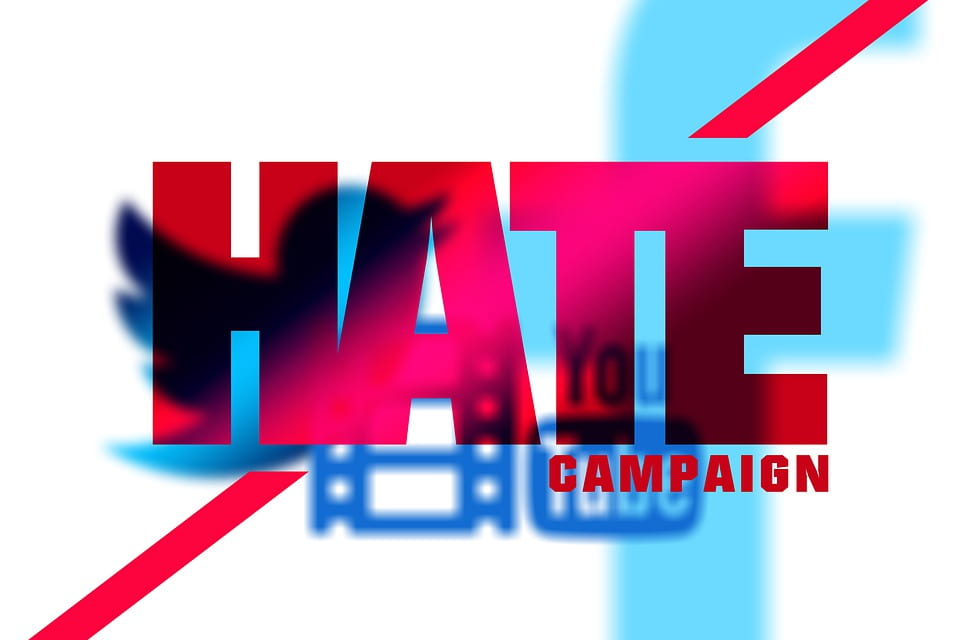By Heng Yi Xin, Bachelor of Social Work (Honours), The University of Auckland
Hate speech is an issue that has gained concern in the wake of the Christchurch terrorist attacks. Hate speech is defined in s61 of the Human Rights Act 1993 as “words which are threatening, abusive or insulting” and that “excite hostility or bring into contempt … on the ground of the colour, race or ethnic or national origins”.
Psychological literature suggests that hate speech is motivated by prejudice, which has gained expression due to a high net migration rate and rising Internet usage. Immigrants are often perceived as outgroup members who threaten the ingroup’s economic interests and cultural norms. Online platforms make it easy for individuals to express socially undesirable opinions anonymously and without accountability.
According to a report by Netsafe in 2018, online hate speech affected 11% of New Zealand adults in 2017 and had a negative impact on their wellbeing. Hate speech forms the psychological foundation for violent acts; one example is the Christchurch terrorist who adopted his extremist views from social media.
Policy Options for Regulating Hate Speech
This blogpost explores five policy options that the New Zealand Government can consider to address hate speech. Ensuring dignity and equal rights for minority groups is of priority, but should not unjustifiably restrict other rights, such as the right to freedom of expression.
First, the root causes of prejudice can be alleviated by introducing intercultural understanding into the school curriculum, which has led to greater acceptance for plurality. However, interfaith dialogues could further stigmatise students from minority groups if they are enlisted as the token minority or bear the sole responsibility for representing their group.
Second, the reach of hate speech can be reduced by legally requiring internet service providers (ISPs) to remove online hate speech within a reasonable timeframe. This policy is aligned with moves made by Australia, Canada, the EU and Germany. In the EU, ISPs now assess 89% of flagged content within 24 hours and remove 72% of content deemed to be illegal hate speech, compared to 40% and 28% when the Code of Conduct was launched in 2016. But this scenario is not ideal because local Internet restrictions can be overcome, private corporations become the arbiters of censorship and overzealous censorship can delete unpopular but lawful expressions.
Third, the frequency of hate speech can be reduced by legally requiring Internet users to authenticate their real names before publishing content. South Korea implemented the Real Name Verification Law in 2007, which required users to verify their identity using a Resident Registration Number before commenting on websites. This policy, though effective in significantly reducing uninhibited behaviour, is vulnerable to security breaches. In fact, South Korea abandoned this policy after the personal information of 35 million users was stolen in 2011. Moreover, this restriction of privacy, which has protective effects for whistle-blowers and victims of domestic violence, is disproportionate as authorities already can track anonymous users. The South Korean example has shown that this policy will receive condemnation from international human rights organisations and ISPs are unlikely to demonstrate compliance.
Fourth, hate speech can be deterred by explicitly recognising it as a crime under the Criminal Code and improving access to civil remedies. Currently, the Human Rights Review Tribunal is slow in responding to complaints made. Hate speech can be persecuted under the s131 of the Human Rights Act (HRA); however, the penalties (up to 3 months imprisonment and a fine of up to $7,000) are light compared to other multicultural Western democracies. Expressly criminalising hate speech under the Criminal Code may increase residents’ confidence to report to the police and signal strong condemnation.
Critics argue that suppressing hate speech is a threat to freedom of expression. However, restrictions to this freedom are justified under article 19(3) of the International Covenant on Civil and Political Rights if such restriction is prescribed by law, pursues a legitimate aim, is effective in achieving the objective and is proportionate to the aim. Suppressing forms of hate speech which are gateways to violence reasonably meets such criteria, if a narrow definition of hate speech is construed. Research by Gelber and McNamara (2015) also indicated that Australia’s civil hate speech laws had a civilising effect on discourse but did not reduce robust debate on controversial issues.
Fifth, we can choose to take no action. Academics argue that hatred against a group is already considered when sentencing a crime under Section 9 of the Sentencing Act. However, anecdotal evidence suggests that there is a rise in discriminatory behaviour and there have been persistent calls to strengthen hate speech laws even before the Christchurch attacks. Thus, a policy response is required.
Implementing Policies to Regulate Hate Speech
Explicitly establishing hate speech as a criminal offence and strengthening civil remedies appears to be the most effective and least restrictive policy option. Iwi should be involved in the entire process to discuss the implications of the Bill on Te Tiriti o Waitangi obligations.
An amendment that recognises a narrow legal construction of hate speech as a crime should be introduced into the Crimes Act 1961. Benchmarking to legislation from other Western democracies suggests that only hate speech that causes a credible danger that a serious criminal harm might be committed should be criminalised.
Consent from the Attorney-General should still be required before prosecution. Specific defences should be stipulated to the offence. A person might not be convicted if the communicated statement:
- Is true and was made in good faith
- Was a critique made of foreign governments
- Was an attempt to criticise belief systems, including religious ones, and did not advocate hatred
- Was part of a journalistic work which reported the views of others
Artistic expression should not be granted immunity and religious beliefs cannot be cited as defence, lest it is legal to urge the killing of a particular group under such pretexts. Religion, sexual orientation and gender, to which protection is accorded by most jurisdictions, should be added as protected attributes to establish parity in law. Other characteristics such as political opinion, HIV status, age, mental and physical disabilities, family status and conviction history should be considered.
An expedited complaint process to address hate speech that does not meet the threshold for criminal sanction should be facilitated by increasing staff numbers in the Human Rights Commission (HRC) and in Community Law Centres (CLCs), and by establishing a national recording system. There should be a legal requirement for complaints to be fully resolved within six months, which is benchmarked to the Official Information Act response time. The Human Rights Commission and the Minister of Justice must report on hate speech statistics annually to evaluate the success of this policy.
* This is adapted from Heng Yi Xin’s winning entry in the University of Auckland’s Public Policy Club’s 2019 Brief-Writing Competition




